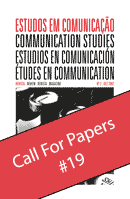Call For Papers Communication Studies 19 (special issue)
II Communicating Science: Emerging Publication Models
The Academic Journal Communication Studies/Estudos em Comunicação invites you to present your research/article to its special edition under the subject Communicating Science: Emerging Publication Models.
The mainstream scientific publishing model has been going through high volatile developments in recent years. To the exponential growth of science, of the number of scientists, and of the amount of publications, just as it was described by Solla Price in the 60s, new challenges were added, related to the publication models, both consolidated and emerging. The question was in part accelerated by the indiscriminate use of the impact factor for purposes other than those intended by its creator, Eugene Garfield, propelled by the creation of a powerful industry of quantification of science. The phenomena associated to "The number that's devouring science", as Monastersky called it, results from the shift of a successful quantification technique to the qualitative assessment of science by managers and scientific policy-makers.
As an unintended consequence of the increasing pressure for the publication of results, a whole new industry, parasiting science and scientometrics, has known a formidable momentum in recent years: predatory publishing. Its business model is adaptable and diverse, ranging from false or cloned academic journals, to the creation of fake editorial boards, peer-review simulation, or, the most severe form, hi-jacking legitimate journals.
This special issue of Communication Studies intends to address the issues of the publication and evaluation of science in the light of this double paradox: a paradigm of science management that favors the mass appearance of predatory publishers; and the abuse of the "number that’s devouring science", by management, but also by journals and authors, through cartelization schemes or coercion to maximize the impact of publications. Predatory practices require as an answer a serious and credible indexing of publications, that can free science and scientists from such risks. But serious and credible indexing is not itself immune to predatory practices, trying to capture it from within. Reflect critically on the intensification of this logic and paradoxes it generates is the purpose of this special issue of Communication Studies, accepting papers on topics such as:







